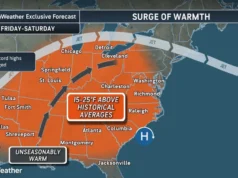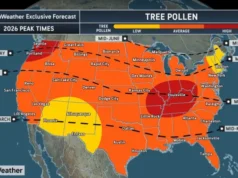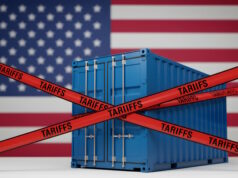
With the start of hurricane season less than a month away, U.S. officials who predict, prepare for and respond to natural disasters had a message for Floridians on Friday: It’s not a matter of if a hurricane will hit, but when.
The 2024 hurricane season is expected to be busier than average. To ensure that people everywhere are prepared, officials visited residents in Sanford, a landlocked city in the middle of the Sunshine State.
Even if they don’t live on the coast, the officials told residents, they need to know the potential danger hurricanes pose to their property, such as flooding; and put together an emergency plan that includes a supply kit.
“Everybody in Florida is at risk,” said Michael Brennan, director of the National Hurricane Center.
As if to punctuate Florida’s vulnerability to damaging weather, wind gusts of 71 mph (114 kph), just shy of hurricane force, were recorded early Friday in Tallahassee, where mangled metal and other debris from damaged buildings littered parts of the state’s capital city.
The officials in Sanford brought along two “hurricane hunter” planes used in the daredevil business of flying into the middle of storms to gather data about their intensity and direction.
The WP-3D, operated by the National Oceanic and Atmospheric Administration, and the WC-130J, flown by the U.S. Air Force Reserve, fly straight into the storms’ eyewall, usually three times during a flight. The aim of the hair-raising trips is to gather information that can help officials on the ground make decisions such as when to order people to evacuate.
NOAA’s propeller plane typically has 11 to 17 people on board during flights through hurricanes, including the crew and scientists. Since flights usually last eight hours, the crew members bring plenty of snack food, and there is a microwave, refrigerator and a hot plate for cooking more elaborate meals.
Although the rides can be very bumpy, sometimes they aren’t as turbulent as expected and crew members don’t realize that they already are in the eye of a hurricane, said William Wysinger, a NOAA flight engineer who has flown on a dozen missions through hurricanes.
“I liken it to riding an old wooden roller coaster during the worst of times,” Wysinger said.
The National Hurricane Center is predicting that the upcoming Atlantic and Gulf season, which runs from June 1 to Nov. 30, will exceed the yearly average of seven tropical storms and seven hurricanes, and that three of the storms will be major. Not all hurricanes make landfall.
Floridians would be wise to remember 20 years ago when four hurricanes made landfall consecutively in just a matter of weeks, crisscrossing the state and carving paths of disaster, said David Sharp, meteorologist-in-charge at the National Weather Service in Melbourne, Florida.
“Many remember the ravages of the Hurricanes Charley, Frances, Ivan and Jeanne — blue tarps and pink insulation everywhere, along with displaced lives,” Sharp said. “Scars upon the land but also scars upon the psyche of our people.”
Hundreds of thousands of new residents have arrived in Florida since the last hurricane season, and it’s important that they know what to expect and how to prepare, said Robbie Berg, warning coordination meteorologist at the National Hurricane Center.
“Talk to your neighbors,” Berg said. “A lot of people in Florida have experienced these storms and they can help you through a storm if you’ve never been through one before.”
Disclaimer
Artificial Intelligence Disclosure & Legal Disclaimer
AI Content Policy.
To provide our readers with timely and comprehensive coverage, South Florida Reporter uses artificial intelligence (AI) to assist in producing certain articles and visual content.
Articles: AI may be used to assist in research, structural drafting, or data analysis. All AI-assisted text is reviewed and edited by our team to ensure accuracy and adherence to our editorial standards.
Images: Any imagery generated or significantly altered by AI is clearly marked with a disclaimer or watermark to distinguish it from traditional photography or editorial illustrations.
General Disclaimer
The information contained in South Florida Reporter is for general information purposes only.
South Florida Reporter assumes no responsibility for errors or omissions in the contents of the Service. In no event shall South Florida Reporter be liable for any special, direct, indirect, consequential, or incidental damages or any damages whatsoever, whether in an action of contract, negligence or other tort, arising out of or in connection with the use of the Service or the contents of the Service.
The Company reserves the right to make additions, deletions, or modifications to the contents of the Service at any time without prior notice. The Company does not warrant that the Service is free of viruses or other harmful components.












